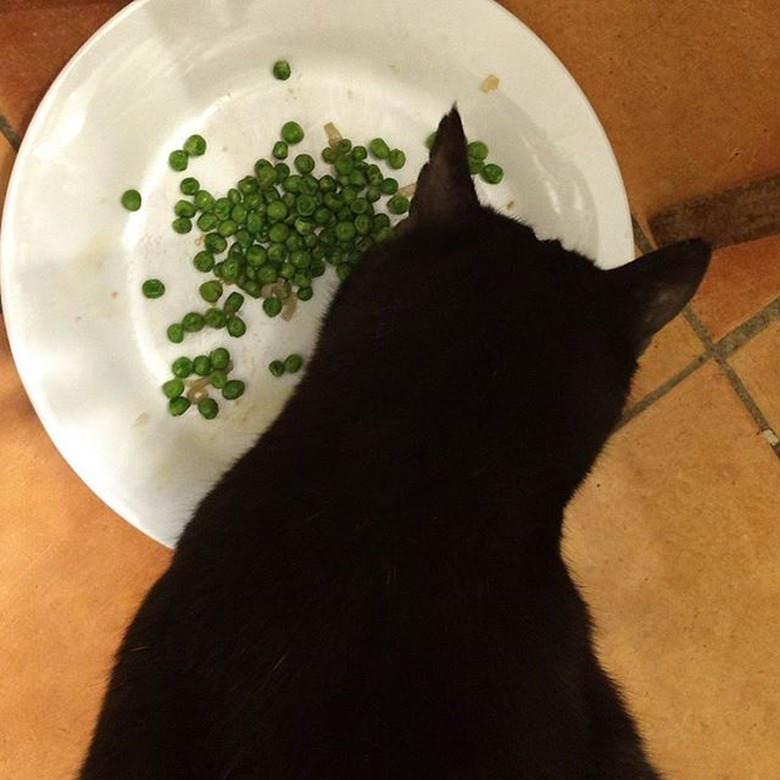Can Cats Eat Peas?
We all remember those childhood days of having to eat our peas before leaving the table. Peas are filled with nutrients that are great for our human bodies. Some of these nutrients also help our beloved pets get big and strong.
Cats require lots of meat-based protein in their diets, but are veggies essential too? If so, can cats eat peas? Let's solve the mystery.
Are peas safe for cats?
Are peas safe for cats?
Cats are obligate carnivores, meaning they require a substantial amount of meat in their diets. It is safe, however, for cats to eat other foods such as vegetables. Peas are one of the vegetables that cats can safely eat and enjoy!
Pet owners often worry about what human foods are safe for their cats and rightfully so. It's important to know what foods are non-toxic and digestible before sharing some of your favorites with your kitty. Fortunately, peas are not only non-toxic to cats, they can be beneficial to feline health.
Benefits of peas
Benefits of peas
Peas are filled with vitamins B1, C, and K. They also contain dietary fiber and minerals such as manganese, copper, potassium, and iron. These nutrients are great for a cat's health and in some cases have a positive effect on a cat's gastrointestinal tract. As a starchy food that's high in fiber, peas can help cats that suffer from occasional constipation. The legume is often added to many cat foods for this very reason.
MEOW: What To Know Before Feeding Your Cats Turkey
As a low-calorie treat, peas are great for cats with a little more meat on their bones. They can be a beneficial aide in getting your cat focused on healthier foods while still providing them with a fun treat.
Different types of peas
Different types of peas
The three different types of peas are green (or garden) peas, snow peas, and snap peas. Luckily, if properly prepared and given in moderation, all three types of peas are safe for cats. Cats can eat fresh, frozen or cooked peas. Just make sure that if the peas are frozen, they are still soft enough for your cat to chew to avoid choking. Your best bet will be fresh, bland, unsalted peas. The plainer the pea, the less likely to upset your kitty's tummy.
Always make sure the peas are not seasoned! Seasonings such as onions and garlic are toxic to cats and must always be avoided.
How should I serve peas to my cat?
How should I serve peas to my cat?
Peas contain sugar (but not too much). It makes them enjoyable for cats and humans to have as a snack a couple times per week. Large amounts of peas, however, can come with some negative side effects like vomiting or diarrhea.
If peas are new to your cat's diet, make sure to introduce them slowly. You can sprinkle a few on top of their food for starters and monitor him for any negative reactions. Like with all new foods, if you notice vomiting, diarrhea or any other problems, stop feeding peas to your cat and consult your veterinarian immediately.
MEW: ARE CATS REALLY AFRAID OF CUCUMBERS?
Although peas are just fine for your cat to enjoy, they should never replace a balanced, meat-based diet. If your cat wouldn't seek out a particular food in nature, that's a sure sign to only provide that food as a treat in moderation if at all.
Conclusion
Conclusion
Although it is fine to feed your cat frozen or canned peas, fresh peas that have not been seasoned are your safest bet. Fresh peas in moderation can be used as a healthy treat. Filled with fiber, vitamins, and nutrients, peas are an appropriate supplement in a cat's meat-based diet but should never become a regular staple. So, it looks like we'll have to keep eating our peas while our kitties enjoy them only as a treat. What a world!
Always check with your veterinarian before changing your pet's diet, medication, or physical activity routines. This information is not a substitute for a vet's opinion.
